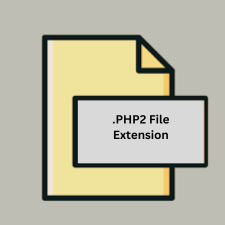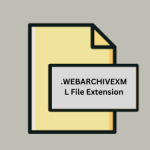.PHP2 File Extension
What is an PHP2 file?
The .php2 file extension is an alternative filename extension for PHP (Hypertext Preprocessor) files. PHP is a popular server-side scripting language designed primarily for web development but also used as a general-purpose language.
More Information.
- Early PHP Versions: PHP 2 was one of the earliest versions of PHP, released in the late 1990s. During this time, PHP was evolving rapidly, and different versions were sometimes denoted by different file extensions.
- Version Distinction: The
.php2file extension was used to indicate files specifically written for PHP version 2, allowing web servers to process these files correctly in environments where multiple versions of PHP were installed.
Origin Of This File.
The .php2 extension was introduced as a way to distinguish PHP files that were intended to be processed by PHP version 2, which was an early version of the PHP language. The .php2 extension is not commonly used in modern web development but may still be encountered in legacy systems.
File Structure Technical Specification.
- File Structure: A
.php2file is structurally similar to other PHP files. It contains a mix of HTML and PHP code. PHP code is embedded within PHP tags (<?php ... ?>) and is executed on the server-side to generate dynamic content. - Technical Specification: There are no significant differences in the technical specifications of
.php2files compared to.phpfiles other than the version of PHP they were designed for. The file is processed by a PHP interpreter which executes the PHP code and returns the resulting HTML to the web browser.
How to Convert the File?
Windows
- Using File Explorer:
- Open File Explorer.
- Navigate to the folder containing your
.php2file. - Right-click the file and select Rename.
- Change the file extension from
.php2to.php(e.g.,example.php2toexample.php). - Press Enter to save the new name. Confirm any warnings about changing file extensions if prompted.
- Using Command Prompt:
- Open Command Prompt (
cmd) from the Start menu. - Navigate to the directory containing the file using the
cdcommand. - Use the
rencommand to rename the file:ren example.php2 example.php.
- Open Command Prompt (
Linux
- Using the Terminal:
- Open a terminal window.
- Navigate to the directory containing the file using the
cdcommand. - Rename the file using the
mvcommand:mv example.php2 example.php.
- Using File Manager:
- Open your file manager (such as Nautilus, Dolphin, or Thunar).
- Locate the
.php2file. - Right-click the file and select Rename.
- Change the extension from
.php2to.phpand confirm the change.
macOS
- Using Finder:
- Open Finder.
- Navigate to the folder containing your
.php2file. - Click on the file to select it, then click on the file name to make it editable.
- Change the extension from
.php2to.php(e.g.,example.php2toexample.php). - Press Return to save the new name. Confirm any warnings about changing file extensions if prompted.
- Using Terminal:
- Open Terminal from Applications > Utilities.
- Navigate to the directory containing the file using the
cdcommand. - Rename the file using the
mvcommand:mv example.php2 example.php.
Android
- Using File Manager Apps:
- Open your file manager app (such as Files by Google, or a third-party file manager).
- Navigate to the directory containing the
.php2file. - Long-press the file and select Rename.
- Change the file extension from
.php2to.php. - Save the new name.
- Using a Terminal Emulator (if rooted):
- Open a terminal emulator app.
- Navigate to the directory containing the file using the
cdcommand. - Rename the file using the
mvcommand:mv example.php2 example.php.
iOS
- Using Files App:
- Open the Files app.
- Navigate to the directory containing the
.php2file. - Tap and hold the file, then select Rename from the context menu.
- Change the file extension from
.php2to.php. - Save the new name.
- Using a Text Editing App:
- Use an app like Textastic or Koder that supports file management.
- Open the file in the app.
- Save or export the file with a new name, changing the extension from
.php2to.php.
Others (General Guidance)
- Online File Renaming Tools:
- You can use online file renaming tools or services to upload the file and rename it.
- Custom or Less Common Systems:
- For custom or less common operating systems, the general process involves locating the file and renaming it, often through a file manager or command-line interface. Refer to the specific documentation or user interface of the system for detailed instructions.
Advantages And Disadvantages.
Advantages:
- Version Control: The
.php2extension can help in distinguishing between files meant for different versions of PHP, which can be useful for maintaining compatibility with older systems.
Disadvantages:
- Obsolescence: The
.php2extension is largely obsolete. Modern PHP versions have unified file extensions (typically.php), making.php2largely redundant and less supported. - Compatibility Issues: Newer PHP interpreters may not recognize or process
.php2files as expected without specific configuration.
How to Open PHP2?
Open In Windows
- Using a Web Server: To view a
.php2file in a web browser on Windows, ensure your web server (like Apache or Nginx) is configured to handle.php2files, or rename the file to.php. - Text Editors: You can open and edit
.php2files with text editors such as Notepad++, Sublime Text, or Visual Studio Code.
Open In Linux
- Using a Web Server: Similar to Windows, ensure your web server on Linux (such as Apache or Nginx) can process
.php2files, or rename the file to.php. - Text Editors: You can open and edit
.php2files using text editors like Vim, Nano, or Gedit.
Open In MAC
- Using a Web Server: Configure your web server on macOS (like MAMP or XAMPP) to handle
.php2files, or rename them to.php. - Text Editors: Edit
.php2files with editors such as TextEdit, Sublime Text, or VSCode.
Open In Android
Text Editors: Use a text editor app on Android, like QuickEdit or AIDE, to open and edit .php2 files. For viewing the files in a web context, you might need a server app or rename the file to .php and use a web server app.
Open In IOS
Text Editors: Use text editor apps available for iOS, such as Textastic or Koder, to view and edit .php2 files. For web development, you might need a more advanced setup, potentially involving server-side capabilities through specific apps or remote servers.
Open in Others
- Web Servers: Any web server capable of handling PHP scripts can be configured to process
.php2files. This might include older or customized server environments. - File Conversion: For any other platform or system, converting
.php2to.phpis typically the best approach to ensure compatibility with modern PHP setups.














